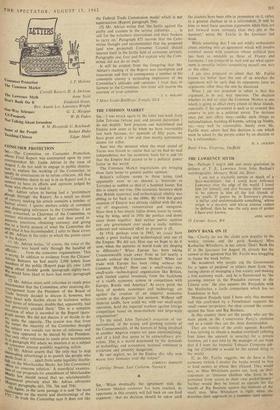Stit,—When eventually the agreement with the Common Market countries has
been reached, its opponents in this country will fall back on one final argument: that no decision should be taken until
the electors have been able to pronounce on it, either at a general election or at a referendum. It will be time to meet these specious arguments when they are put forward more seriously than they _are at the moment,' wrote Mr. Fairlie in the Spectator last week.
While admitting that I am not wildly enthusiastic about entering into an agreement which will involve eventual union with countries whose political past has been as unstable as those of France and Germany. I am prepared to wait and see what agree- ment is possible before committing myself one way or the other.
I am also prepared to .admit that Mr. Fairlie knows far 'better than the rest of us whether the agreement will be such that its opponents have no arguments other than the one he discussed. What I am not prepared to admit is that this argument, is in- any way specious. The decision whether or.not to enter the Common Market is one which is going to affect every citizen of these islands, especially if the agreement is such as to commit this country to join in a political union. The decision once put into effect may—unlike such things as nationalisation, building H-bombs, setting up Neddy, etc.—very well be irreversible. Surely even Mr. Fairlie must admit that this decision is one which must be taken by the people either by an election or ' by a referendum„






























 Previous page
Previous page